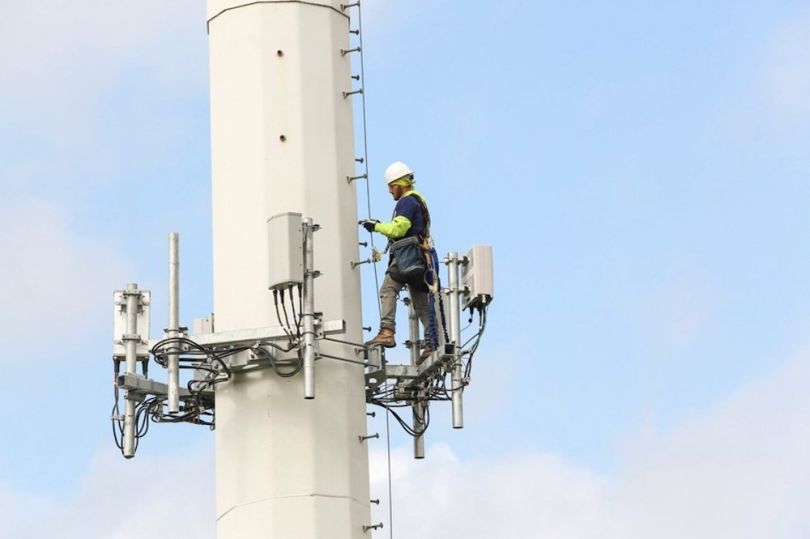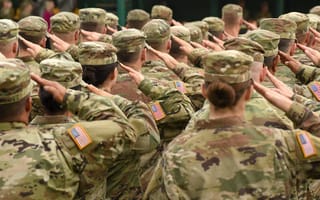It’s tough out there for recruiters. Just 3.5 percent of the country’s workforce finds itself unemployed, and as demand for high-skilled folks in the tech industry continues to climb, talent remains hard to come by.
In an age of labor scarcity, many tech companies are turning to the potential of an oft-overlooked demographic: military veterans. Although the unemployment rate among veterans has been falling since 2000, ex-service members still face a number of setbacks — including stereotypes about non-transferable military skills and the supposed cultural challenges they pose — as they apply for and settle into tech careers. Collectively, such barriers contribute to an overall trend of underemployment among former servicemen and women. But for companies looking for more diversity in skill, thought and experience, the rewards born out of investing in veterans abound.
“In my experience, military people who have successfully made the transition are some of the most decisive, driven, successful and high-performing professionals,” said Cris Challender, a Navy veteran who leads training and development efforts at SAC Wireless. “They do very, very well once they’re inside. Getting in the door is the hurdle.”
SAC Wireless, a Chicago-based Nokia subsidiary that builds and maintains wireless network infrastructure, is in the midst of a major push to install 5G infrastructure on cell towers across the country. Challender said that the work — which involves climbing and connecting equipment to cell towers and deploying small cell technology on rooftops and lamp posts — offers a perfect opportunity for many ex-service members to transition into private employment. As such, his team is increasingly tapping military veterans to fill its ranks.

And SAC isn’t alone. Companies across the country are exploring ways to formalize programs that invest in the employment and professional development of military veterans. In 2017, tech giant Amazon committed to hiring 25,000 veterans within five years, while companies like Dell, HP and Tesla have similarly pledged to hire at least 1,000 each.
“Employers often don’t know how to translate a veteran’s vocation into something that works in the context of their business,” said Challender. “Oftentimes it becomes a real challenge. How do you help an employer understand what you’re capable of in a context that, to an employer, looks nothing like what you did before?”
Transition Training and Support
Regardless of the hiring need, there are a number of ways companies can help veterans navigate the transition into the workforce — even if the work isn’t as ostensibly similar to military operations as the work of SAC Wireless’ tower crews. For its part, software giant Oracle has invested in a dedicated recruitment team to help ex-service members get a foot in the door, an internal veterans network to connect employees with colleagues who have similar experiences, and a mentorship program to help them rise through the ranks.

“In my experience, veterans generally perform very well in program or project management roles, and make great analysts,” said Gerry Borja, an ex-Army policeman who now works as a senior diversity and inclusion program manager for Oracle. “But I have also seen veterans become exceptional sales people.”
Other companies seek to leverage military officers’ leadership skills. Aircraft engine supplier GE Aviation runs a Junior Officer Leadership Program that recruits commissioned officers and provides specialized training over the course of two years. The goal is to build more bridges between veterans and leadership opportunities at the company.
“The kind of leaders who make a difference to a business are not necessarily those who are deep in the weeds of a particular topic,” said Mark Fogel, a former Air Force pilot who now works on the program. “We build on the soft skills you gain in the military. How do you stay cool and composed under pressure? How do you build teams that trust you?”
Skills, Perspective And The Bottom Line
Recruiters know that those soft skills are hard to find. A 2016 LinkedIn survey found veterans excel in attention to detail, integrity and team leadership — skills more than half of hiring managers struggle to source.
For SAC Wireless’ tower crews, Challender said a veteran’s experience with ongoing training is also a massive boon.
“We find that for the most part, military people are accustomed to listening intently because they’re constantly aware of being in a training situation,” he said. “Following direction is also a very well-refined skill for military people.”
Following instructions to the letter is extremely important for tower crews working with heavy equipment hundreds of feet in the air. The work requires a safety-first mindset that Challender said ex-service members will recognize from their military experience.
“Even though the equipment and setting are different, the situation feels very familiar,” he said.
“As veterans, we will probably never be as cold, hungry, tired or even as scared as we were at certain times when we were serving our country.”
After spending time learning how to safely climb towers and install telecommunications systems, many talented SAC Wireless tower workers transition away from the physical work and into more advanced opportunities. When they leave the towers, Challender said SAC Wireless’ internal veterans’ network kicks in to help them navigate the corporate environment.
“Military people are usually trained and rewarded for translating the world into very binary situations, very black and white,” he said. “And that’s what’s difficult for veterans coming into a business world that operates predominantly in ambiguity.”
Oracle’s “GUIDON” mentor program is similarly designed to smooth the transition into white-collar work for recently hired veterans. The idea is to pair new hires with an Oracle employee who also served in the military in an attempt to bridge a workplace cultural divide that can often exist between ex-service members and lifelong civilians.
“My question for [veterans] is: did you pick your specialty, or did Uncle Sam pick it for you?” said Borja. “They might feel pigeonholed into taking a certain role, simply because that’s all they’ve known since they completed high school or college.”
To be sure, the experiences of those who serve in the military are by no means homogenous. And there’s no cookie-cutter profile of what of veteran’s individual skills and perspectives are — or are not. That’s why many companies take a more personalized approach to building support programs, like Oracle’s one-on-one mentorship initiative or GE Aviation’s Junior Officer Leadership Program.

“The military is not a monolith,” said Fogel. “Some come in from a very hierarchical experience with a chain of command that must be followed. But others come in from a flat organizational experience, where they have been given autonomy to make decisions and operate independent of any kind of decision-making authority.
“GE is a fairly non-hierarchical organization,” he added. “We try to get our new program members to understand how to influence people by virtue of their skills, credibility and experience, which may be unique depending on who the person is.”
For those employers that know how to channel the experiences of veterans and set individuals up to thrive, rewards are evident. A 2019 Indiana University Northwest study found that military-friendly businesses produce financial returns that are on average more than 5 percent higher than others. For businesses like SAC Wireless, Oracle and GE Aviation, the benefits of hiring ex-service members has been long recognized.
“We don’t freak out when the server goes down,” Borja said. “As veterans, we will probably never be as cold, hungry, tired or even as scared as we were at certain times when we were serving our country.”



